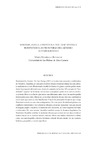Please use this identifier to cite or link to this item:
https://accedacris.ulpgc.es/jspui/handle/10553/15558
| Title: | Bordelands / La frontera: the new mestiza: rompiendo las fronteras del género autobiográfico | Authors: | Henríquez Betancor, María | UNESCO Clasification: | 550510 Filología 570107 Lengua y literatura 6202 Teoría, análisis y crítica literarias |
Issue Date: | 2010 | Journal: | Philologica canariensia | Abstract: | Borderlands/La Frontera: The New Mestiza (1987) es la obra más conocida y emblemática de Gloria E. Anzaldúa, la conocida escritora chicana contemporánea. En este artículo analizaremos cómo Borderlands desafía los límites de género autobiográfico tanto desde la perspectiva formal como desde el contenido de la obra. El concepto de “borderlands” (espacio de frontera) crea la base conceptual a partir de la cual se construye el texto. Éste es un hecho que marca una diferencia entre ésta y las autobiografías tradicionales pues estas últimas no se escriben alrededor de una idea sino centrándose en el sujeto que narra su vida linealmente. Una de las principales fronteras que rompe Borderlands es la de ser una obra multigenérica. Por otra parte, Borderlands plantea sus conflictos individuales y los colectivos chicanos, propone respuestas con una mezcla de lenguas (inglés y español), la tradición oral y la escrita, así como registros formales e informales. De esta manera Anzaldúa también rompe la frontera lingüística. En Borderlands Anzaldúa redefine la identidad chicana que se nutre de sus raíces multiculturales a través de su escritura radical y atrevida. Desde este análisis Borderlands se define como una autobiografía colectiva feminista cultural chicana dentro de un contexto histórico, geográfico y social específicos. Borderlands/La Frontera: The New Mestiza (1987) is contemporary Chicana writer Gloria E. Anzaldúa’s best-known and most emblematic work. In this article we will analyze how Borderlands challenges the borders of the autobiographical genre both form the formal perspective and from the work content. The concept of “borderlands” creates the conceptual base from which the text is constructed. This is a fact that makes a difference between this one and traditional autobiographies as these last ones are not written around an idea but focussing on a subject which narrates his/her life in a lineal mode. One of the principal borders that Borderlands breaks is that of being a multigeneric text. On the other hand, Borderlands presents Anzaldúa’s individual conflicts as well Chicano/as’s; it proposes answers mixing languages (English and Spanish), oral and written traditions, as well as formal and informal registers. This way the author breaks the linguistic border too. In Borderlands Anzaldúa redefines Chicana identity, which nurtures itself in her multicultural roots, using her radical and daring writing. In this light Borderlands is defined as a collective cultural feminist Chicana autobiography within a specific historical, geographical and social context. |
URI: | https://accedacris.ulpgc.es/handle/10553/15558 | ISSN: | 1136-3169 | Source: | Philologica canariensia [ISSN 1136-3169]n. 16, p. 63-84 | URL: | http://dialnet.unirioja.es/servlet/articulo?codigo=5287443 |
| Appears in Collections: | Philologica Canariensia. n.016-17, 2010-2011 Artículos |
Page view(s) 5
139
checked on Jan 11, 2026
Download(s)
1,442
checked on Jan 11, 2026
Google ScholarTM
Check
Share
Export metadata
Items in accedaCRIS are protected by copyright, with all rights reserved, unless otherwise indicated.
